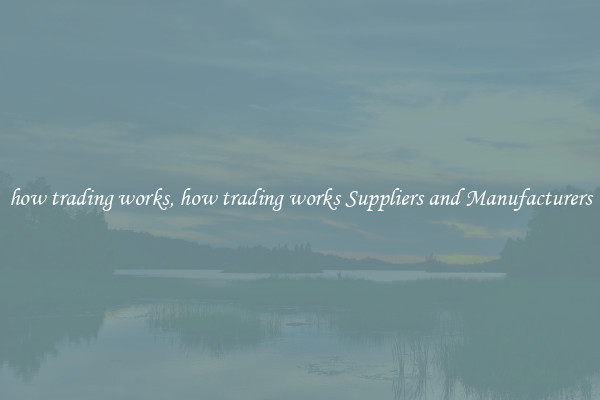how trading works, how trading works Suppliers and Manufacturers
Trading is an integral part of the global economy, connecting suppliers and manufacturers from different corners of the world. It is a complex process that involves the exchange of goods or services between two parties, with each party seeking to benefit from the transaction. In this article, we will discuss how trading works and the role of suppliers and manufacturers in this process.

Trading essentially involves the buying and selling of goods or services. Buyers, often referred to as consumers or customers, seek to acquire products or services that fulfill their needs or desires. On the other hand, suppliers and manufacturers are responsible for producing and providing these goods or services to meet the demand of the buyers.
Suppliers are entities or individuals who source, produce, or manufacture goods. They play a crucial role in the trading process as they are responsible for creating the products that will eventually be sold to customers. Suppliers can range from small local businesses to large multinational corporations, each with their own capabilities and resources.
Manufacturers, on the other hand, are specialized suppliers who transform raw materials into finished goods. They add value to the raw materials by using various manufacturing processes, such as assembly, fabrication, or packaging. Manufacturers can be found in different industries, such as automotive, electronics, or textiles, among others.
The trading process begins with buyers identifying their needs or desires and expressing this demand in the market. Suppliers assess this demand and determine if they can fulfill it, either through existing inventory or production capabilities. If a buyer’s needs align with a supplier’s offerings, negotiations on pricing, quantities, and delivery terms take place.
Once an agreement has been reached, the transaction is executed through the exchange of money for goods or services. Delivery may involve physical transportation of goods, digital delivery of services, or a combination of both. Throughout the process, suppliers and manufacturers focus on ensuring the quality and timely delivery of the promised goods or services.
Trading is not limited to a single transaction, as it often involves building long-term relationships between buyers, suppliers, and manufacturers. Repeat business is fostered through trust, effective communication, and consistently meeting customer expectations. This results in mutually beneficial arrangements that are advantageous for all parties involved.
With the rise of globalization and technological advancements, trading has become more accessible, efficient, and interconnected. The internet has played a pivotal role in expanding trading opportunities, allowing suppliers and manufacturers to reach a broader market and connect with buyers from around the world.
In conclusion, trading is a dynamic process that involves the exchange of goods or services between buyers, suppliers, and manufacturers. The collaboration between these entities drives economic growth and provides consumers with the products they desire. By understanding how trading works, suppliers and manufacturers can effectively contribute to the global marketplace, meeting customer needs and cultivating successful and sustainable business relationships.

View details

View details

View details

View details








